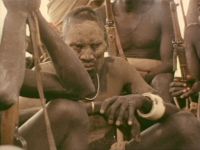8 épisodes
(7 h 20 min)
Épisodes
S5 E1 • Dervishes of Kurdistan
The village of Baiveh, in Iran's rugged mountain frontier with Iraq, is home to a group of Kurds who belong to the Quadiri dervishes, a mystical cult of Islam. This program examines the role that religion plays in their daily lives - through ceremonies like the Zikr, in which the dervishes work themselves into an ecstatic trance, able then to endure electric shocks and pass skewers through their flesh without apparently hurting themselves. The dervish tribesmen claim fantastic powers for their leader, the 27-year old Sheikh Hossein - for him, they will skewer their faces, slash their bodies, lick white-hot spoons, and eat glass. Since religious power goes hand in hand with political power in traditional Kurdish society, the sheikh is both spiritual and temporal leader. And as Hossein claims a personal link with God, his religious authority is paramount - only by his authority can a dervish aspire to communion with God.
Première diffusion : 4 octobre 1974
S5 E2 • The Mursi
The Mursi are a tribe living in southwestern Ethiopia, along the Omo River. They are constantly at war about grazing rights with a neighboring tribe, the Bodi - and the most interesting feature of their way of life is the open public debate through which they settle their most important problems, including that of the war. As we learn from the filmmakers, "They never shout each other down, never interrupt, always allow every man to have his say - [there is] no chairman, no vote
Première diffusion : 13 novembre 1974
S5 E3 • Mehinacu
The Mehinacu are a delightful people living near the headwaters of the River Xingu in central Brazil. The idyllic lifestyle and joyous outlook of this society is now threatened by a motorway being cut through their territory. As a people, they know they are doomed.
Première diffusion : 20 novembre 1974
S5 E4 • Masai Women
"The Maasai, a prosperous society of animal herders whose sustenence and wealth is their cattle, live primarily in the Rift Valley between Kenya and Tanzania. Women tend the cattle, bring up the children, clean mud from the village when it rains, and belong to a man's estate. This film highlights the Maasai female's rights of passage from childhood to old age, and her lot in life as she is tied to the fortunes of not only husbands but sons as well. Since they alone can give birth, the women see themselves as important contributors to their husband's wealth and develop close supportive relationships with the co-wives. In this society, if a man is rich, "it's his wives who made him so
Première diffusion : 27 novembre 1974
S5 E5 • Quechua
Focuses on the Quechua, who live in the Andes mountains in an isolated part of Peru. Observes that, unlike many tribes in remote areas, the Quechua desperately want a road to link them with the outside world and its benefits, especially the tourist trade.
Première diffusion : 4 décembre 1974
S5 E6 • The Kawelka of Papua New Guinea
Ongka is a "bigman," a leader of a Kawelka tribe in New Guinea where a man's authority and prestige are derived in large part by his ability to organize a lavish "moka," or gift-giving. The moka is an elaborate system of gifts which forges alliances and maintains peace among the tribes. In this particular moka, which Ongka had been planning for ten years, the gifts included 600 pigs, cattle, rare birds, a motorcycle and a truck. The gifts obligate the recipients to repay the debt with even more "generosity" so as to maintain their own prestige. The film closely chronicles this celebration, including the preparations, and reveals a fascinating portrait of Ongka himself
Première diffusion : 11 décembre 1974
S5 E7 • The Sakuddei
Describes the life of the Sakuddei who live on the Indonesian island of Siberut off the west coast of Sumatra. Portrays their peaceful existence which is being threatened by modern society and the corruption of money, missionaries, civil servants, and industry (especially lumber companies).
Première diffusion : 18 décembre 1974
S5 E8 • Masai Manhood
An ethnographic view of Masai culture and society, focusing on the preparation of young Masai boys for manhood and leadership in their society. Follows the seven years of transition in which the boys serve as warriors and learn about survival and the outside world, as dictated by their elders.
Première diffusion : 8 avril 1975


